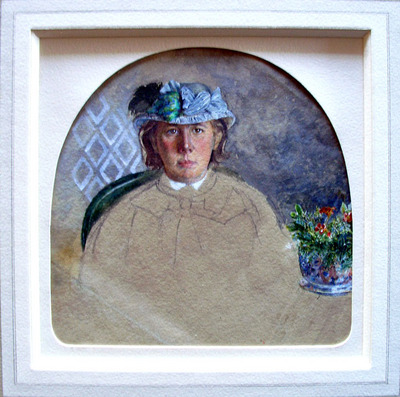Unknown artist, Portrait of Emily Faithfull, ca. 1860-70. Watercolor with pencil. Graphic Arts GAX 2011- in process.
At the age of twenty-three, Emily Faithfull (1835-1895) fell in with a group of women led by Barbara Leigh Smith, who called themselves the “Langham Place Circle.” These ladies worked together to promote women’s suffrage and other social reforms, such as a campaign to have university examinations opened to women. In 1859, Faithfull and the others formed the Society for Promoting the Employment of Women.
In their search for skilled professions suitable for women, Faithfull and Bessie Parkes looked into the printing trade, specifically the position of the compositor. The two women bought a small press and took a few lessons to see if they were capable of performing this job, which of course they were.
On March 25, 1860, Faithfull used her own money to establish the Victoria Press with female compositors and proof-readers, and some men to do the heavy lifting. The Society for Promoting the Employment of Women apprenticed five girls to the Press at premiums of £10 each; others were apprenticed by relatives and friends.
Serious objections came from the London Printer’s Union, an all male organization, which claimed that women lacked the intelligence to be compositors (“The job requires the application of a mechanical mind and the female mind is not mechanical”).
At the same time, Faithfull had many supporters. Prominent authors including Alfred Tennyson, William Makepeace Thackeray, Thomas Carlyle, Matthew Arnold, and Anthony Trollope offered material to be printed and published by these women. The result was The Victoria Regia, A Volume of Original Contributions in Poetry & Prose (1861 (Ex) 3955.379).
On July 23, 1860, Emily Faithfull sent a letter to the editor of The Times (London). “So great is the success of this office,” wrote Faithfull, “that I have more work at this moment than my 12 women compositors can undertake, and I shall therefore be glad to receive six or eight girls immediately. They must be under 16 years of age, and apply personally at my office next week.”
The Victoria Press was a commercial success, operating for over twenty years, and leading to Faithfull’s appointment as “Printer and Publisher in Ordinary to Her Majesty.”
